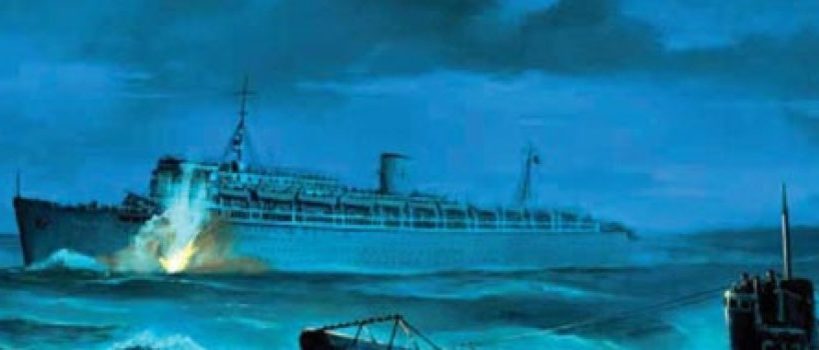Wilhelm Gustloff: Greatest Maritime Disaster
Posted on 8th June 2021
Alexander Marinesko was born in the port city of Odessa on 15 January, 1913. His actual name was Alexandru Marinescu but his Rumanian parents altered it to make it appear more Russian.
He was a temperamental young man who was easily bored and suffered from night demons often seeking solace from both in the contents of a bottle; and as was fitting for a man of Odessa he sought a career at sea but not in the Merchant Marine, instead he opted for the Soviet Navy. Recognised as a talented Officer he made steady progress through the ranks even if personal ambition was sometimes derailed by a deep seated streak of irresponsibility.
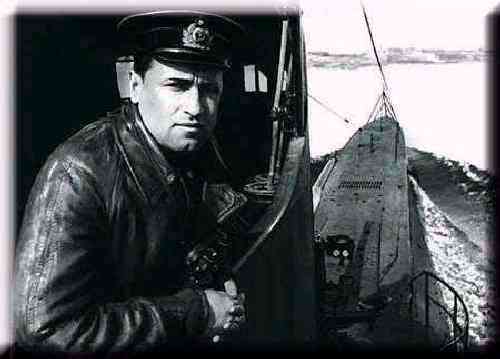
In 1939, he was assigned to the Baltic Fleet and given command of the submarine M.96 then considered one of the most modern in the world. Despite the honour involved in being given such a command he wasn’t entirely trusted, the Navy being aware of his Rumanian background, and so upon the outbreak of war with Germany in July 1941 he was transferred to the Caspian Sea to serve as a Training Officer.
Training Cadets bored him terribly and he did little to disguise his disinterest turning up late, often out of uniform and frequently the worse for wear. Indeed, his lack of sobriety was to lead to his expulsion from the Communist Party which given the Russian attachment to vodka was quite an achievement.
In the spring of 1942, he was provided with the opportunity to see action and his talent quickly became apparent. He understood submarine warfare, manoeuvred his vessel well and was brave to the point of recklessness but he was also a liar and braggart who often exaggerated his exploits which only brought him the enmity of his fellow Officers.
Despite a boastful nature and chequered past he retained his command but the streak of irresponsibility that had so blighted his career remained and at one point he effectively deserted the service to go and live with a Swedish woman he had met at a drunken New Year’s Eve party he attended in the port of Hanko. Such an act might have not only cost him his command but this life. As it was no action was taken but his lack of discipline had made him and by extrapolation his crew, expendable.
So, on 11 January 1945 in command of the submarine S.13, he was sent to patrol the dangerous sea lanes that separated East from West Prussia and here he was to remain patiently at his station for days on end but without success. Frequently attacked by German patrol boats and spotter planes he could see little point in remaining where he was and aware that the city of Memel had recently fallen to the Red Army and that the Germans would be looking to evacuate their remaining troops he manoeuvred S.13 into a position he thought the most likely to intercept the transports.
On the 12 January 1945 the Russians broke through the German lines and the German Army on the Eastern Front was in full retreat. By 26 January, Prussia had been cut off from the rest of Germany and the only escape was by sea. In the port of Gotenhafen (Gdynia) more than 35,000 civilian refugees and military personnel crammed the docks.
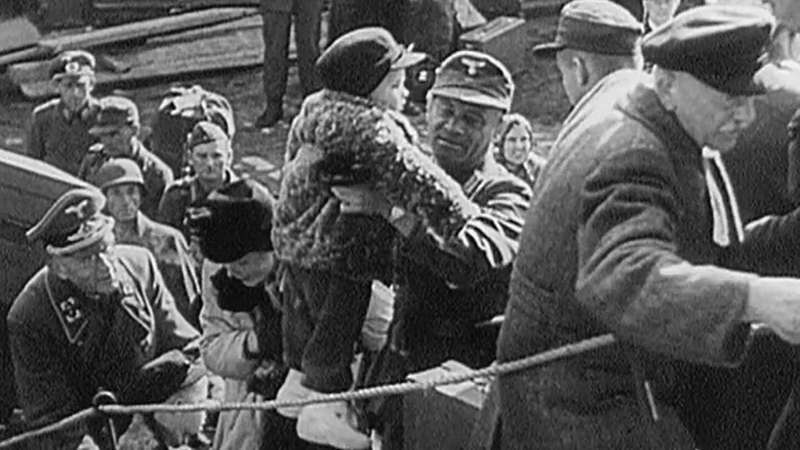
In port were the Liners Hansa and Wilhelm Gustloff with their escorts preparing to evacuate people as part of Operation Hannibal and so desperate were people to get aboard, that fistfights broke out on the quayside and order had to be restored by force.
The Wilhelm Gustloff was a luxury cruise ship constructed in 1937 as part of the Strength through Joy Programme to provide luxury holidays for workers, though it was mostly used by Nazi Party dignitaries and their families. It was a sleek beautiful vessel but by now it had been stripped of all its trappings of grandeur to make as much space as possible available.
With a displacement of 25,000 tons and designed to carry just 1,800 passengers and crew when she steamed out of Gotenhafen Harbour at 12.30 pm on 30 January 1945 she had more than 10,500 passengers aboard, 4,000 of whom were children.
It was a foul night, the sea was rough, the air cold and the snow and rain was being whipped up by strong winds. Not long after setting sail the Hansa and one of the escorts battered by the storm were forced to return to port with mechanical problems. The Wilhelm Gustloff was now on her own except for a single torpedo boat assigned for her protection.
On board were four experienced Sea Captains and a row soon broke out as to the best way to proceed. Captain Wilhelm Zahn, Head of the U Boat Division, suggested that they should douse the ships lights and hug the coastline. Friedrich Petersen, the Gustloff’s Captain, preferred to head for deep water where he believed a more powerful escort of Minesweepers awaited them. He would also keep the ship’s lights on to avoid the likelihood of collision, something he feared more in the poor visibility than he did the possibility of encountering a submarine.
Aboard the ship conditions were uncomfortable. The passageways were jammed, the cabins full, every nook and cranny crammed with people and in many parts of the ship it was standing room only.
The order had earlier been given for people to always keep their lifejackets on but so uncomfortable were they to wear that this was largely ignored. In the meantime, the crew were mostly preoccupied with keeping the ship free of ice.
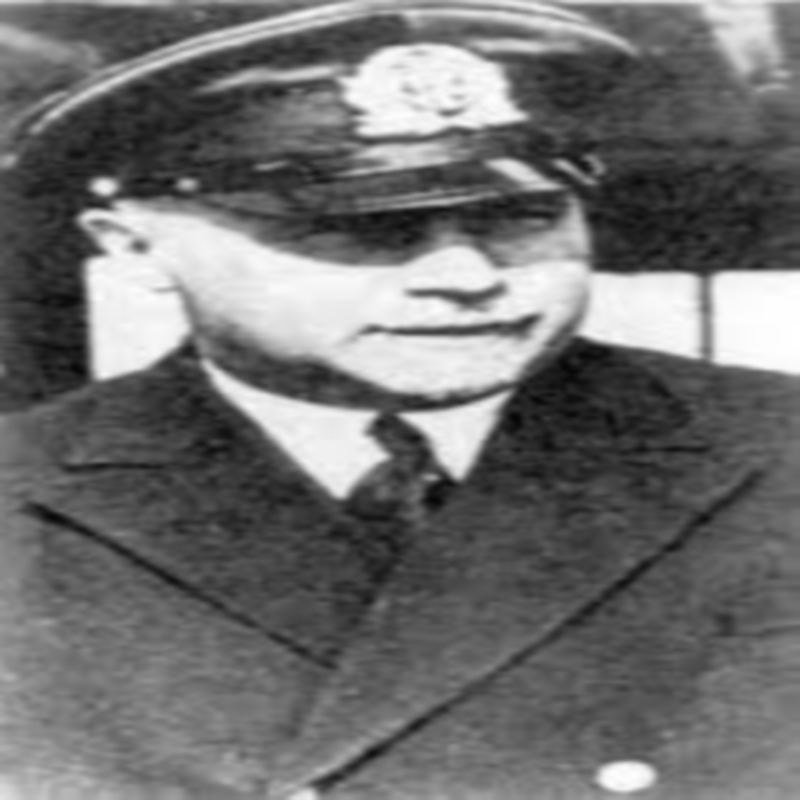
So as to maintain a level of calm on board Captain Petersen ordered that cheerful music be piped throughout the ship, though the music ceased and everyone stopped what they were doing to listen to a speech given by Adolf Hitler on the anniversary of his coming to power and the ship was for a time plunged into a somewhat eerie silence except for the sound of the Fuhrer’s voice that is.
Just after 8 pm on 30 January, a crew member aboard Submarine S.13 spotted a light far in the distance. He at first thought it was probably the light from a familiar local Lighthouse but decided that he should report the sighting to the Captain anyway and Marinesko, who was in his cabin completing the usual paperwork, was summoned to the conning tower.
As the light got closer and the sighting became more distinct, he could see that it was a huge ship, possibly an Ocean Liner – an Ocean Liner with its lights on! He could not believe his good fortune. Presented with the opportunity of a lifetime Marinesko was determined to get it right and so he stalked the ship for hours, approaching it from the shore side to get a better shot. This was a dangerous manoeuvre for he knew the area was heavily mined and criss-crossed with sandbanks, but he skilfully steered the submarine through depths sometimes as little as 30 metres. It was a brave thing to do, but then no one had ever doubted his courage.
Approaching to within a thousand yards of the ship, and in the early hours of a bitterly cold morning, he ordered the launching of three torpedoes saying as he did so - for the Motherland and the Soviet people.
On board the Gustloff, Captain Petersen who had been in a state of heightened anxiety ever since leaving port was in his cabin able to relax at last confident that the most perilous part of the journey was over when a huge explosion sent him scurrying up to the bridge where he was heard to utter the words “This is it! This is it!”
Survivors described how the first torpedo hitting made the whole ship shake as if it had been struck by a meteor. Petersen immediately ordered the watertight doors closed trapping thousands of people below decks and quite literally sealing their doom. Another torpedo then struck the quarters of the Women’s Naval Reserve incinerating those inside with only 3 out of 374 of the women surviving.
The lights aboard the Gustloff now went out plunging the ship into darkness. Shortly afterwards the third torpedo struck the engine room and the Gustloff began to list heavily to port. It was now clear to everyone that the ship was doomed, and panic began to break out with gunshots heard as the crew tried to maintain some semblance of order among the screaming and terrified passengers.
But it was to no avail as people were trampled to death in the rush for the boats and only a cordon of armed men prevented them from being swamped. Some military personnel, particularly those incapacitated that could not be evacuated, now committed suicide.
A problem with the boats only added to the climate of fear as people were forced to wait anxiously as the crew struggled to free them frozen as they were to their davits.
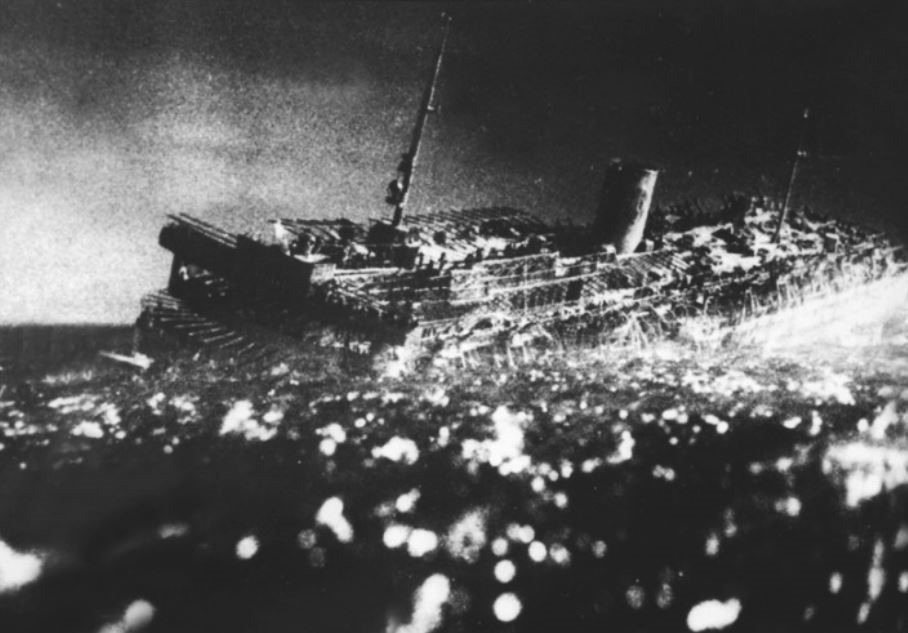
It was normal procedure for the boats to be swung out in preparation for hasty release before sailing but Petersen had not done this because he did not want to induce a sense of fear among the passengers. Now they could not be released in time and the ship was sinking fast.
Lifejackets that had earlier been discarded were now being fought over and they were also found to be too big for the children and simply tipped them over in the water and survivors later testified to the number of little legs they saw sticking out of the sea. The temperature of the water was such that it made having a lifejacket or not almost irrelevant. Survival time in the ice-cold waters of the Baltic Sea was minimal. For those struggling in the darkness below decks it was already too late and they were drowned in the frozen water now flooding the ship.
An hour after being hit by the first torpedo the Wilhelm Gustloff sank to the bottom taking thousands of victims with her.
The message had gone out for all German shipping in the area to rush to the scene and a frantic rescue operation was now underway with the Cruiser Admiral Hipper the first to arrive but following reports that submarines might still be in the area left again without taking on board any survivors.
Many of those dragged from the water were already dead and so many bodies were seen in the water that nets were used to scoop them up in the manner of a boat trawling for fish.
The most recent research suggests that 9,400 people drowned froze, or were burned to death but the likelihood remains that it was many more. Some 1,250 were plucked from the water, including the 67 year old Captain Petersen, who had abandoned ship early and the other three Captains who had been aboard; with no women and children first order being given it was the survival of the fittest and most were military personnel - it was the greatest maritime disaster in history.
Captain Marinesko was unaware of the scale of his achievement but soon would be and just over a week later he confirmed his reputation as the world’s deadliest submariner when he torpedoed and sank the hospital ship Steuben with 5,000 injured German soldiers and crew on board drowning more than 3,000 of them.
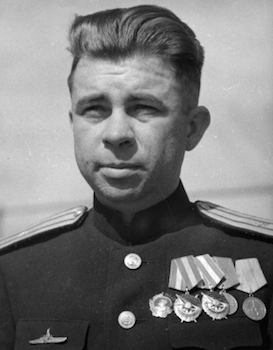
Returning to port Marinesko expected to be awarded the title Hero of the Soviet Union but his reputation as a braggart went before him and his enemies were many. So instead, his achievement was honoured with the Order of the Red Banner. When his superiors turned up to present him with his award, he protested by submerging his submarine not returning to the surface until they had departed.
Following the end of the war Marinesko’s life quickly unravelled. His drinking escalated until it was out of control. In September 1945 he was demoted and two months later discharged from the Navy altogether.
Diagnosed as an alcoholic and as suffering from severe mental illness he was effectively unemployable quickly descending into poverty. In 1949 he was jailed for two years for theft.
He died aged 50 on 25 November 1963, a broken and forgotten man.
In May 1990 he finally got the recognition he thought his exploits deserved when he was posthumously awarded the title Hero of the Soviet Union and statues now stand in his honour in his hometown of Odessa and the port city of Kaliningrad.
Many consider what Alexander Marinesko did to have been a war crime. Had he have known that the Gustloff was primarily a refugee ship would it have made any difference to his decision to sink it? Probably not, and it can be argued that the high number of specialised military personnel on board made it a legitimate target. But then such things are lost in the fog of war. Instead, he was a man who did his duty bravely and with considerable daring but it remained a moment of acute horror in an often desperate life, and one which it was said was a torment to him in both the light of day and on the darkest of nights.
Share this post:





